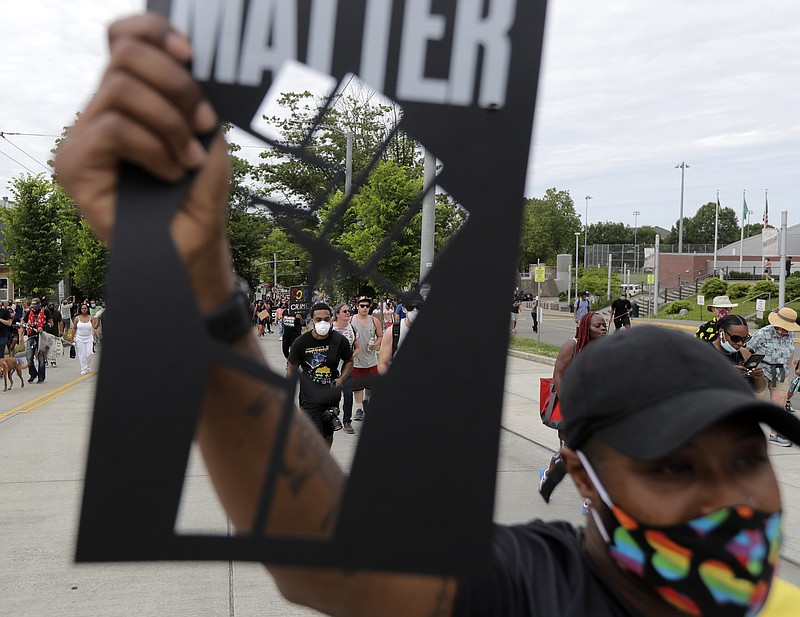Maybe you've never heard of tiny Hillsdale College in Hillsdale, Michigan, but you should. Because the leaders of Hillsdale College did something last week that should have been the model for all businesses and organizations that have treated people fairly and done the right thing all along.
The leaders of the private college published a statement in the college newspaper The Collegian that said instead of being forced to respond to pressure to speak out about the furor following the violent death of black suspect George Floyd at the hands of a white Minneapolis police officer, it would remain silent.
The college was founded by Free Will Baptist abolitionists in 1844, was among the first to grant education to black Americans, was the second in the country to provide four-year, liberal arts degrees to women and saw a higher percentage of its students enlist to fight for the Union during the Civil War than any other college. Abolitionist leader Frederick Douglass twice spoke at the school, including his well-known address "Popular Error and Unpopular Truth," and a statue of him is a part of the school's Liberty Walk.
Further, in the 1970s when the federal government attempted to force the college to discriminate against potential students based on race, the college refused. Although that meant the loss of all federal funding to its students and the college, Hillsdale turned to additional private funding to further its mission.
Today, although its racial diversity is thought to be relatively low - since it does not accept federal money, it does not have to report such figures - the overall diversity of its more than 1,400 students eclipses the national average (led by gender and geographic diversity), according to collegefactual.com.
A spokeswoman for the college said officials "literally" do not ask students' race and therefore have no data to report.
In their recent statement, Hillsdale leaders said, "The College is pressed to speak. It is told that saying what it always has said is insufficient. Instead, it must decry racism and the mistreatment of Black Americans in particular. This, however, is precisely what the College has always said."
Failure to issue statements about "justice and equality, is an erasure, a complicity, an abandonment of principle," the leaders said they were told. The college's silence, they were told, "is deafening."
Instead, they maintain, among other things, Hillsdale's founding as an abolitionist college is a statement itself; its teaching that "takes up - with vigor - the evils we are alleged to ignore, evils like murder, brutality, injustice, destruction of person or property, and passionate irrationality," is a statement; its organization "so that we can maintain principles of equity and justice - though the cost is high and sympathy is short - is a statement"; its "dispensing of unparalleled financial help to students who cannot afford even a moderate tuition, is a statement"; and its "helping private and public schools across the country lift their primary and secondary students out of a sea of disadvantages with excellent instruction, curricula, and the civic principles of freedom and equality - without any recompense to the College - is a statement."
"[A]ll of these statements are acts, deeds that speak ... every day, all the time. Everything the College does ... is for the moral and intellectual uplift of all."
We believe that is how organizations, businesses and individuals should conduct themselves - "for the moral and intellectual uplift of all."
For some organizations and businesses, that may mean a constant reexamination of principles and actions. For some, it may mean walking the same straight line they've always walked. For individuals, it should mean a daily reexamination of conscience to determine if thoughts, words and deeds match that moral and intellectual uplift, if what's said, heard and done at home are the same as at work, in public or in leisure pursuits, and if generosity of spirit, courage of convictions, sacrifice of self and cheerfulness in countenance are hallmarks of daily life.
However, all those things should come from within rather than from, as Hillsdale leaders said they were getting pressure to do, "jumping on cost-free bandwagons of public feeling - perhaps even deeply justified public feeling - and winning approval by espousing the right opinion."
"But the fact that very real racial problems are now being cynically exploited for profit, gain, and public favor by some organizations and people is impossible to overlook," the Hillsdale leaders wrote. "It is a scandal and a shame that compounds our ills and impedes their correction."
Cheap virtue means little if it's just words strung together to satisfy someone's idea of conformity. Consistently doing the right thing is something else.
